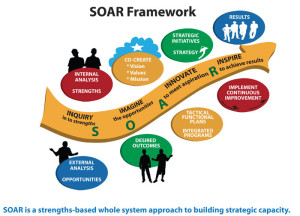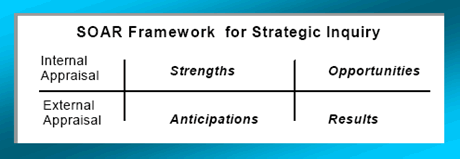Socially Constructing a New Corporate Purpose
Imagine a sustainable world where humanity meets the needs of the present without compromising the ability of future generations to meet their own needs. Business provides the goods and services needed by consumers in a way beneficial to all stakeholders. The world’s vast wealth is equitably distributed to all people. We on Earth are working toward that future today.
This is a story of AI applied to corporate strategic planning with an examination into the tacit economic assumptions of business.
The SOAR (Strengths, Opportunities, Anticipations, Results) framework for strategic inquiry and decision-making is discussed. SOAR is a compatible framework for an AI approach to strategic planning. Next, we review the dominant mental model of purpose underlying strategic planning. and an alternate perspective, flowing into a reflection of what could be.
The dominant construct in business is the theory that the purpose of a business is to maximise shareholder wealth. This theory will be contrasted with an alternate view—the “triple bottom line.” The purpose is not to choose either perspective as correct, distinct from the other, or even good; it is to inquire and appreciatively reflect into how these theories are socially constructed with an eye towards creating the change we desire.


